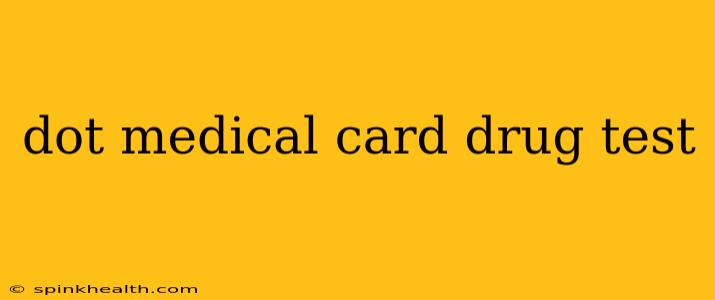The rumble of the big rig, the open road stretching before you – for many commercial drivers, this is the life. But the life of a professional driver comes with responsibilities, and one of the most crucial is maintaining a clean driving record and passing regular Department of Transportation (DOT) physicals, including drug testing. This isn't just about safety; it's about adhering to the rules and regulations that keep our highways safe for everyone. This journey into the world of DOT medical card drug tests will unravel the complexities and answer your burning questions.
Let's start at the beginning. Imagine yourself, ready to embark on a new career or simply renew your existing DOT medical certification. You've scheduled your DOT physical. The anticipation is palpable. But somewhere in the back of your mind, the question looms: what exactly happens during the drug testing portion of a DOT physical?
What Happens During a DOT Drug Test?
The DOT drug test isn't some casual urine sample. It's a rigorous procedure designed to ensure accuracy and reliability. The process typically involves the following steps:
-
Sample Collection: A designated Collection Site, certified by the DOT, is where you'll provide your urine sample. Strict protocols are in place to prevent tampering or substitution. You'll be observed to prevent any manipulation of the sample.
-
Chain of Custody: This is crucial. A detailed chain of custody document meticulously tracks the sample from collection to testing laboratory. Every individual handling the sample must sign and date the document, guaranteeing sample integrity and preventing any doubts about the testing process.
-
Laboratory Testing: The sample is sent to a certified laboratory that's specifically approved for DOT drug testing. These labs adhere to strict quality control measures to ensure accurate and reliable results.
-
Results Reporting: Results are usually available within a few days. A positive result will trigger further investigation and potential consequences, including loss of your DOT medical certification.
What Drugs Are Tested For in a DOT Medical Card Drug Test?
The DOT mandates testing for a specific panel of drugs:
- Marijuana: This remains a significant concern due to its potential to impair judgment and reaction time.
- Cocaine: A stimulant that can dramatically impact driving ability.
- Amphetamines: Another stimulant, often misused and leading to impaired driving capabilities.
- Opiates: This class of drugs, including prescription painkillers like opioids, can cause drowsiness and slowed reflexes.
- Phencyclidine (PCP): A powerful hallucinogen with profoundly dangerous effects on driving.
It's important to understand that the presence of even trace amounts of these substances can lead to a positive result, leading to potential suspension of your medical certification.
How Long Do Drugs Stay in Your System?
This is a common question, and the answer depends on several factors, including:
- Type of drug: Different drugs metabolize at different rates.
- Frequency of use: Regular use will lead to longer detection times.
- Metabolism: Individual metabolic rates can significantly impact detection times.
- Dosage: Higher doses naturally stay in the system longer.
While there are general guidelines available online, it's crucial to remember that these are just estimates. The only definitive answer comes from a negative drug test.
Can I Refuse a DOT Drug Test?
Refusing a DOT drug test carries severe consequences. Refusal is considered the same as a positive test, resulting in immediate disqualification from driving commercially. This means you will lose your DOT medical card, and getting it back is a lengthy and challenging process.
What if I Have a Prescription for a Controlled Substance?
If you are prescribed medications that fall under the DOT's testing categories (opioids, for example), you must disclose this information to your medical examiner during your DOT physical. They will review your prescription to ensure you are using the medication as directed.
What Happens if I Fail a DOT Drug Test?
A positive result will result in the immediate revocation of your DOT medical certification. You'll need to undergo rehabilitation and potentially additional testing before you can re-apply.
The road to obtaining and maintaining a DOT medical card is a serious commitment. Understanding the intricacies of the drug testing process is critical for any commercial driver. Remember, safety is paramount – both for yourself and for everyone else on the road. This journey highlights the seriousness of drug testing and the vital role it plays in ensuring the safety of our nation's highways.

